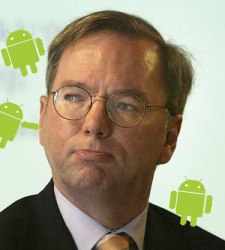We’ve spent the better part of yesterday cruising around the Central Hall on a quest to highlight the coolest tech at CES, but Google executive chairman Eric Schmidt was on hand at CNET’s Next Big Thing panel to talk about the future of consumer electronics. While doing so, he (perhaps unsurprisingly) made it clear that he isn’t a fan of the word “fragmentation” when it comes to Google’s Android OS.
“You have to be careful with that word,” he cautioned. He actually prefers to use the term “differentiation” to describe the situation, as his definition of fragmentation is when certain apps are able to run on one particular flavor of Android and not other. “What people really care about is if there’s an interoperable ecosystem of apps.”
In Schmidt’s eyes, differentiation is a means for Android-using partners to woo customers with their own take on a common platform. As long as every Android customer is able to use the same apps, he doesn’t see much of a problem.
“Differentiation means that you have a choice and the people who are making the phones, they’re going to compete on their view of innovation, and they’re going to try and convince you that theirs is better than somebody else,” Schmidt said.
A quick look at the breakdown of Android versions currently in use shows that certain versions have settled into common use, but the sheer number of manufacturers working with Android means that the timing for new software updates can be dramatically different from company to company.
The highly customized nature of some manufacturer-specific Android builds also means that device-specific maintenance and support updates can take extra time to implement, which leads to an Android landscape where some companies pull ahead and others lag when it comes to customer experience. Is that necessarily fair to every customer? Not really, but it seems we’ll all just have to deal with it for the foreseeable future.
Correction: Updated to reflect that Schmidt’s comments were made at CNET’s Next Big Thing panel.
